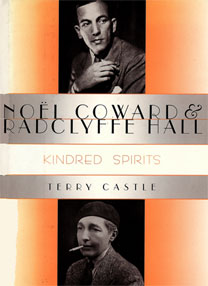
Noel Coward & Radclyffe Hall
Kindred Spirits(From the Dustjacket)
A literary exploration of the friendship between Noel Coward and Radclyffe Hall, this book sheds light on the relationship between gay men and lesbian women in England, France, and America in the first half of the 20th century.
(Reviewers’ Comments)
“Coward’s plays also create an erotic ideal of androgyny. Terry Castle has written a deliriously fizzy critical study of Coward and Radclyffe Hall, demonstrating how their discreetly coded personae met in a shared territory of slicked-back hair, severe evening dress and teasing dressing gowns. Between the wars, Cecil Beaton wrote, “all sorts of men suddenly wanted to look like Noel Coward–sleek and satiny, clipped and well groomed, with a cigarette, a telephone, or a cocktail at hand”. During the 1920s and 1930s Coward developed an iconography of androgyny– a celebrated photo with Gertrude Lawrence in Private Lives poses them as near-reflections of fashionable sheen, with otter-slim shoulders and cigarette holders cocked for combat.” —David Jays, The New Statesman
“Breaking ranks with lesbian separatists prominent since the 1970s, the author uses Hall and Coward to demonstrate the ‘rich yet neglected cultural relationships that have existed between gay men and lesbians in England and America since the turn of the century’. . . . An accessibly written, fascinating treatment of its subject.” —Choice
“An illuminating account of the relationship between two of twentieth-century homosexual history’s most striking literary personalities. This rich little book draws attention to the some-t imes-neglected crossover between lesbian and gay male culture in this century. Lively, thought-provoking, well-researched–and a great read!” —Marjorie Garber, author of Vice Versa: Bisexuality and the Eroticism of Everyday Life
“In her landmark study, The Apparitional Lesbian: Female Homosexuality and Modern Culture, Terry Castle called on feminist and lesbian historians to “focus on presence instead of absence, plenitude instead of scarcity.” Her binary portrait of Noel Coward and Radclyffe Hall traces the friendship and compares the public perceptions of these two homosexual icons of the 1930s. Castle suggests that these two very different writers influenced each other’s work in surprising ways. The homosexual playwright, Jonathan Brockett, who appears in Hall’s lesbian classic The Well of Loneliness, bears a striking resemblance to Coward. The blithe spirit that hovers over Coward’s play of the same name may have had its genesis in Hall’s ideas and writings about the supernatural. This well illustrated book also shows that Hall and Coward shared a fashion sense.” – Amazon.com
“A well-crafted, playful, and probing look at the previously unexamined friendship of Noel Coward and Radclyffe Hall–and at their influence on each other’s work. Novelist Hall is known for melancholy; her most famous work is the much-parodied–though still widely read–The Well of Loneliness, the 1928 coming-out tale of a brooding butch, intended as a plea for tolerance of lesbians. Hall achieved a sort of political martyrdom when The Well became the subject of a celebrated obscenity trial. Coward is quite a contrasting figure; a lifelong comic actor and playwright, he approached nothing without irony. His relationship to gay identity was seemingly opposite, too, never going public about his homosexuality. Despite these differences, Castle (English/Stanford; The Apparitional Lesbian, 1993) makes a convincing case for a close literary relationship between the two, as well as a fabulously entertaining argument for an influence on each other’s wardrobe. She finds that they make up characters based on each other and echo each other’s phrases. Perhaps most amusingly, in Coward’s play Blithe Spirit, he seems to draw directly on Hall’s real-life psychic dabblings. The author also finds in both of their writings a surprisingly similar frustration with, and critique of, the narrowness of heterosexual convention. Castle argues that studying such friendships yields a deeper understanding of the rich history of relations between gay men and lesbians. These groups are too often studied separately, even assumed to have been mostly antagonistic to each other; in fact, there has long been friendship, collaboration, and fellow- feeling between them. At times, Castle makes too much of similarities that could be coincidental; mostly, though, she gets away with this because her readings are as close as they are imaginative. Though Castle is theoretically sophisticated, her prose is accessible and witty. A fine contribution to both literary and queer history.” –Kirkus Reviews
“At first glance, it seems difficult to imagine two more different literary personalities than Noel Coward and Radclyffe Hall. Coward’s writing is playful, sarcastic, absurd; Hall’s is brooding and melancholic, rife with misery and suffering. Where she throws her head back in despair, he merely lifts an eyebrow. Yet as Terry Castle displays in her provocative new study, the two had much more in common than critics have been willing to concede. The first look at the literary and biographical link between these influential contemporaries, Noel Coward and Radclyffe Hall recounts a forgotten literary friendship and shows that Coward and Hall even make subtle, “ghostly” appearances in each others’ works. This captivating tale is brought to life in a series of 45 illustrations, including photographs of Hall, Coward, and others in their social circle, along with cartoon renditions of the two from the popular press. Through its imaginative juxtaposition of two major literary figures, this provocative work illuminates how traditional ideas of the differences between male and female homosexuals shield from view a vast arena of cultural understanding. Castle pushes past stale definitions – the tragic lesbian and the witty, urbane gay man – to present a broader picture. In the process, Noel Coward and Radclyffe Hall provides a rich critical vocabulary for bridging the experiences of gays and lesbians in history, casting light upon deep- rooted stereotypes that have long separated the two.” –Liza Featherstone, The Nation
